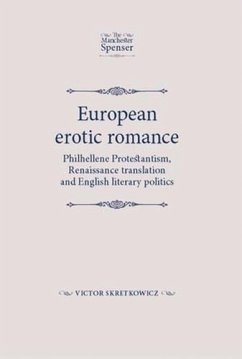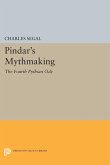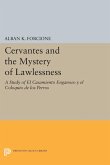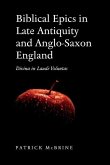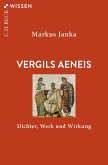Victor Skretkowicz
European Erotic Romance (eBook, PDF)
Philhellene Protestantism, renaissance translation and English literary politics
86,95 €
86,95 €
inkl. MwSt.
Sofort per Download lieferbar

43 °P sammeln
86,95 €
Als Download kaufen

86,95 €
inkl. MwSt.
Sofort per Download lieferbar

43 °P sammeln
Jetzt verschenken
Alle Infos zum eBook verschenken
86,95 €
inkl. MwSt.
Sofort per Download lieferbar
Alle Infos zum eBook verschenken

43 °P sammeln
Victor Skretkowicz
European Erotic Romance (eBook, PDF)
Philhellene Protestantism, renaissance translation and English literary politics
- Format: PDF
- Merkliste
- Auf die Merkliste
- Bewerten Bewerten
- Teilen
- Produkt teilen
- Produkterinnerung
- Produkterinnerung

Bitte loggen Sie sich zunächst in Ihr Kundenkonto ein oder registrieren Sie sich bei
bücher.de, um das eBook-Abo tolino select nutzen zu können.
Hier können Sie sich einloggen
Hier können Sie sich einloggen
Sie sind bereits eingeloggt. Klicken Sie auf 2. tolino select Abo, um fortzufahren.

Bitte loggen Sie sich zunächst in Ihr Kundenkonto ein oder registrieren Sie sich bei bücher.de, um das eBook-Abo tolino select nutzen zu können.
European Erotic Romance examines the Renaissance publication and translation of the ancient Greek erotic romances, and English adaptations of the genre by Sir Philip Sidney, Shakespeare and Lady Mary Sidney Wroth. Providing fresh insight into the development of the novel, this study identifies the politicisation of erotic romance by the European philhellene (lovers of all things Greek) Protestant movement. To English translators and authors, the complex plots, well developed moralised characters (particularly female) and rhetorical styles of the ancient novels signify political and social…mehr
- Geräte: PC
- mit Kopierschutz
- eBook Hilfe
- Größe: 4.74MB
Andere Kunden interessierten sich auch für
![Pindar's Mythmaking (eBook, PDF) Pindar's Mythmaking (eBook, PDF)]() Charles SegalPindar's Mythmaking (eBook, PDF)27,95 €
Charles SegalPindar's Mythmaking (eBook, PDF)27,95 €![Ovid's Heroidos (eBook, PDF) Ovid's Heroidos (eBook, PDF)]() Howard JacobsonOvid's Heroidos (eBook, PDF)53,95 €
Howard JacobsonOvid's Heroidos (eBook, PDF)53,95 €![Cervantes and the Mystery of Lawlessness (eBook, PDF) Cervantes and the Mystery of Lawlessness (eBook, PDF)]() Alban K. ForcioneCervantes and the Mystery of Lawlessness (eBook, PDF)30,95 €
Alban K. ForcioneCervantes and the Mystery of Lawlessness (eBook, PDF)30,95 €![Biblical Epics in Late Antiquity and Anglo-Saxon England (eBook, PDF) Biblical Epics in Late Antiquity and Anglo-Saxon England (eBook, PDF)]() Patrick McBrineBiblical Epics in Late Antiquity and Anglo-Saxon England (eBook, PDF)75,95 €
Patrick McBrineBiblical Epics in Late Antiquity and Anglo-Saxon England (eBook, PDF)75,95 €![Somewhere I Have Never Travelled (eBook, PDF) Somewhere I Have Never Travelled (eBook, PDF)]() Thomas Van NortwickSomewhere I Have Never Travelled (eBook, PDF)17,95 €
Thomas Van NortwickSomewhere I Have Never Travelled (eBook, PDF)17,95 €![Echoes of Two Cultures (eBook, PDF) Echoes of Two Cultures (eBook, PDF)]() Arthur Milton YoungEchoes of Two Cultures (eBook, PDF)26,95 €
Arthur Milton YoungEchoes of Two Cultures (eBook, PDF)26,95 €![Vergils Aeneis (eBook, PDF) Vergils Aeneis (eBook, PDF)]() Markus JankaVergils Aeneis (eBook, PDF)9,99 €
Markus JankaVergils Aeneis (eBook, PDF)9,99 €-
-
-
European Erotic Romance examines the Renaissance publication and translation of the ancient Greek erotic romances, and English adaptations of the genre by Sir Philip Sidney, Shakespeare and Lady Mary Sidney Wroth. Providing fresh insight into the development of the novel, this study identifies the politicisation of erotic romance by the European philhellene (lovers of all things Greek) Protestant movement. To English translators and authors, the complex plots, well developed moralised characters (particularly female) and rhetorical styles of the ancient novels signify political and social reform. Generous quotation and translations ensure that European Erotic Romance is accessible to a broad spectrum of readers. Its organisation lends itself to use as a course text. It is suitable for use by senior undergraduates and specialists in Renaissance literature, translation, rhetoric and history.
Dieser Download kann aus rechtlichen Gründen nur mit Rechnungsadresse in A, D ausgeliefert werden.
Produktdetails
- Produktdetails
- Verlag: University of Pittsburgh Press
- Seitenzahl: 400
- Erscheinungstermin: 30. Juli 2018
- Englisch
- ISBN-13: 9781526135117
- Artikelnr.: 60361168
- Verlag: University of Pittsburgh Press
- Seitenzahl: 400
- Erscheinungstermin: 30. Juli 2018
- Englisch
- ISBN-13: 9781526135117
- Artikelnr.: 60361168
- Herstellerkennzeichnung Die Herstellerinformationen sind derzeit nicht verfügbar.
Victor Skretkowicz joined the Department of English at the University of Dundee in 1978, and remained there until 2009.
Introduction Part One: Greco-Roman Romance in the Renaissance 1 The Nature
of Erotic Romance Greco-Roman Romance of the Second Sophistic and the
Renaissance Aphthonius, Philostratus, Ecphrasis and Artistic Style
Characterisation: Theophrastus and Plutarch Philhellenism and the
Allegorical Politicisation of Erotic Romance 2 Longus's Daphnis and Chloe
The Novel as Ecphrasis Amyot, Translation and the Kings of France Reading,
Education and Translation Translating Erotic Romance Angel Day, The
Shepheards Holidaie and Accession Day, 1587 The Shepheards Holidaie, Court
Drama, and Court Poets Translating Eros: Amyot, Day and Thornley George
Thornley's Itch Angel Day and Dionysophanes' Garden The End: Nothing But
Shepherds' Games Conclusion 3 Achilles Tatius's Leukippe and Kleitophon
Rhetorics of Love European Dissemination Belleforest's French Burton and
the English Philhellenes Hodges, Erotic Arousal and Sidney's Arcadia
Translating the Opening Europa: An Ecphrasis Europa and Apparent Cyclic
Form Kleitophon and Characterisation Kleitophon's Symbolic Dream Kleinias
on Love, Sex and Marriage Kleitophon's Garden Pantheia's Dream Debate on
Erotic Love Sexual Predation Melite and Thersandros The Trial and
Conclusion Conclusion 4 Heliodorus's An Ethiopian Story - Theagenes and
Charikleia Charikliea: Royal Foundling Renaissance Continental Translations
and Philhellene Politics Sandford's Historie of Chariclia and Theagenes
Underdowne's An Aethiopian Historie Fraunce, L'Isle and Gough Exemplary
Characters and Moral Lessons Heliodorus's Political Romance Homeric
Beginnings The Insatiable Demainete Thyamis's Erotic Dream Thyamis's
Priestly Family Rhodopis: Kalasiris's Nightmare Heliodorus's Cyclic Tales
Leadership and the Law Thyamis Justified The Wanton Arsake The Wicked
Kybele Recognising Charikleia Language and Nationalism L'Isle's Political
Panegyric Conclusion Part Two: Philhellene Erotic Romance 5 National
Romance and Sidney's Arcadia Political Outlines Selective Monarchomachia
Evolution of Arcadia Unfolding the Epic Cycle Sub-Plot and Exemplary
Character Philisides and Tiltyard Masquing Costume, Device, and Narrative
Strategy Philoclea's Bed Eroticising Renaissance Romance Erotic Romance and
Erotic Sex Interest Theory, Philhellene Politics, and Erotic Romance The
Novel as Theatre Legal and Political Process as Drama The End of Romance
Conclusion 6 Shakespeare and Philhellene Erotic Romance Shakespeare, Amyot
and North's Plutarch Amyot-North Diction and Style in Coriolanus (1608)
Julius Caesar (1599), Political Identifiers and the Rhetorics of Erotic
Romance Antony, Cleopatra, Octavius and the Huguenots Greville's Antony and
Cleopatra: Politics and Anti-Romance Panegyric in Antony and Cleopatra
(1606): the Rewards of Patronage The Winter's Tale (1609-10): Exemplary
Rapprochement Jealousy, Tyranny, and the Aggressive 'Royal' Style Gendering
Rhetorics: Thucydides and the Ermine Erotic Closure Cymbeline (1609-10),
Rhetorical Style and the Catholic Disjunction Conclusion 7 Mary Sidney
Wroth's Urania Philhellene Protestant Erotic Propaganda Disjunction at the
Throne of Love A French Story The Dispossessed: Urania's Misery Theatres of
Romance Interest Theory Personalised Techniques of Elision Allegorical
Parallelism Urania as Anti-Romance The Great Cham and His Dynasty Urania as
Roman à Clef The Metamorphosis of Mary Sidney Herbert Truth and Illusion
Rodomandro's Masque Female Abuse and Martyrdom Hereditary Succession and
Restoration Liberation, Restoration and Marital Union Meriana and the
Macedonian Succession Romania Allegorised Closing the Sophistic Circle
Urania as Sophistic Erotic Romance Conclusion Chapter 8 The Fate of a Genre
The Semiotics of Erotic Romance Conclusion Bibliography Index of
Place-Names General Index
of Erotic Romance Greco-Roman Romance of the Second Sophistic and the
Renaissance Aphthonius, Philostratus, Ecphrasis and Artistic Style
Characterisation: Theophrastus and Plutarch Philhellenism and the
Allegorical Politicisation of Erotic Romance 2 Longus's Daphnis and Chloe
The Novel as Ecphrasis Amyot, Translation and the Kings of France Reading,
Education and Translation Translating Erotic Romance Angel Day, The
Shepheards Holidaie and Accession Day, 1587 The Shepheards Holidaie, Court
Drama, and Court Poets Translating Eros: Amyot, Day and Thornley George
Thornley's Itch Angel Day and Dionysophanes' Garden The End: Nothing But
Shepherds' Games Conclusion 3 Achilles Tatius's Leukippe and Kleitophon
Rhetorics of Love European Dissemination Belleforest's French Burton and
the English Philhellenes Hodges, Erotic Arousal and Sidney's Arcadia
Translating the Opening Europa: An Ecphrasis Europa and Apparent Cyclic
Form Kleitophon and Characterisation Kleitophon's Symbolic Dream Kleinias
on Love, Sex and Marriage Kleitophon's Garden Pantheia's Dream Debate on
Erotic Love Sexual Predation Melite and Thersandros The Trial and
Conclusion Conclusion 4 Heliodorus's An Ethiopian Story - Theagenes and
Charikleia Charikliea: Royal Foundling Renaissance Continental Translations
and Philhellene Politics Sandford's Historie of Chariclia and Theagenes
Underdowne's An Aethiopian Historie Fraunce, L'Isle and Gough Exemplary
Characters and Moral Lessons Heliodorus's Political Romance Homeric
Beginnings The Insatiable Demainete Thyamis's Erotic Dream Thyamis's
Priestly Family Rhodopis: Kalasiris's Nightmare Heliodorus's Cyclic Tales
Leadership and the Law Thyamis Justified The Wanton Arsake The Wicked
Kybele Recognising Charikleia Language and Nationalism L'Isle's Political
Panegyric Conclusion Part Two: Philhellene Erotic Romance 5 National
Romance and Sidney's Arcadia Political Outlines Selective Monarchomachia
Evolution of Arcadia Unfolding the Epic Cycle Sub-Plot and Exemplary
Character Philisides and Tiltyard Masquing Costume, Device, and Narrative
Strategy Philoclea's Bed Eroticising Renaissance Romance Erotic Romance and
Erotic Sex Interest Theory, Philhellene Politics, and Erotic Romance The
Novel as Theatre Legal and Political Process as Drama The End of Romance
Conclusion 6 Shakespeare and Philhellene Erotic Romance Shakespeare, Amyot
and North's Plutarch Amyot-North Diction and Style in Coriolanus (1608)
Julius Caesar (1599), Political Identifiers and the Rhetorics of Erotic
Romance Antony, Cleopatra, Octavius and the Huguenots Greville's Antony and
Cleopatra: Politics and Anti-Romance Panegyric in Antony and Cleopatra
(1606): the Rewards of Patronage The Winter's Tale (1609-10): Exemplary
Rapprochement Jealousy, Tyranny, and the Aggressive 'Royal' Style Gendering
Rhetorics: Thucydides and the Ermine Erotic Closure Cymbeline (1609-10),
Rhetorical Style and the Catholic Disjunction Conclusion 7 Mary Sidney
Wroth's Urania Philhellene Protestant Erotic Propaganda Disjunction at the
Throne of Love A French Story The Dispossessed: Urania's Misery Theatres of
Romance Interest Theory Personalised Techniques of Elision Allegorical
Parallelism Urania as Anti-Romance The Great Cham and His Dynasty Urania as
Roman à Clef The Metamorphosis of Mary Sidney Herbert Truth and Illusion
Rodomandro's Masque Female Abuse and Martyrdom Hereditary Succession and
Restoration Liberation, Restoration and Marital Union Meriana and the
Macedonian Succession Romania Allegorised Closing the Sophistic Circle
Urania as Sophistic Erotic Romance Conclusion Chapter 8 The Fate of a Genre
The Semiotics of Erotic Romance Conclusion Bibliography Index of
Place-Names General Index
Introduction Part One: Greco-Roman Romance in the Renaissance 1 The Nature
of Erotic Romance Greco-Roman Romance of the Second Sophistic and the
Renaissance Aphthonius, Philostratus, Ecphrasis and Artistic Style
Characterisation: Theophrastus and Plutarch Philhellenism and the
Allegorical Politicisation of Erotic Romance 2 Longus's Daphnis and Chloe
The Novel as Ecphrasis Amyot, Translation and the Kings of France Reading,
Education and Translation Translating Erotic Romance Angel Day, The
Shepheards Holidaie and Accession Day, 1587 The Shepheards Holidaie, Court
Drama, and Court Poets Translating Eros: Amyot, Day and Thornley George
Thornley's Itch Angel Day and Dionysophanes' Garden The End: Nothing But
Shepherds' Games Conclusion 3 Achilles Tatius's Leukippe and Kleitophon
Rhetorics of Love European Dissemination Belleforest's French Burton and
the English Philhellenes Hodges, Erotic Arousal and Sidney's Arcadia
Translating the Opening Europa: An Ecphrasis Europa and Apparent Cyclic
Form Kleitophon and Characterisation Kleitophon's Symbolic Dream Kleinias
on Love, Sex and Marriage Kleitophon's Garden Pantheia's Dream Debate on
Erotic Love Sexual Predation Melite and Thersandros The Trial and
Conclusion Conclusion 4 Heliodorus's An Ethiopian Story - Theagenes and
Charikleia Charikliea: Royal Foundling Renaissance Continental Translations
and Philhellene Politics Sandford's Historie of Chariclia and Theagenes
Underdowne's An Aethiopian Historie Fraunce, L'Isle and Gough Exemplary
Characters and Moral Lessons Heliodorus's Political Romance Homeric
Beginnings The Insatiable Demainete Thyamis's Erotic Dream Thyamis's
Priestly Family Rhodopis: Kalasiris's Nightmare Heliodorus's Cyclic Tales
Leadership and the Law Thyamis Justified The Wanton Arsake The Wicked
Kybele Recognising Charikleia Language and Nationalism L'Isle's Political
Panegyric Conclusion Part Two: Philhellene Erotic Romance 5 National
Romance and Sidney's Arcadia Political Outlines Selective Monarchomachia
Evolution of Arcadia Unfolding the Epic Cycle Sub-Plot and Exemplary
Character Philisides and Tiltyard Masquing Costume, Device, and Narrative
Strategy Philoclea's Bed Eroticising Renaissance Romance Erotic Romance and
Erotic Sex Interest Theory, Philhellene Politics, and Erotic Romance The
Novel as Theatre Legal and Political Process as Drama The End of Romance
Conclusion 6 Shakespeare and Philhellene Erotic Romance Shakespeare, Amyot
and North's Plutarch Amyot-North Diction and Style in Coriolanus (1608)
Julius Caesar (1599), Political Identifiers and the Rhetorics of Erotic
Romance Antony, Cleopatra, Octavius and the Huguenots Greville's Antony and
Cleopatra: Politics and Anti-Romance Panegyric in Antony and Cleopatra
(1606): the Rewards of Patronage The Winter's Tale (1609-10): Exemplary
Rapprochement Jealousy, Tyranny, and the Aggressive 'Royal' Style Gendering
Rhetorics: Thucydides and the Ermine Erotic Closure Cymbeline (1609-10),
Rhetorical Style and the Catholic Disjunction Conclusion 7 Mary Sidney
Wroth's Urania Philhellene Protestant Erotic Propaganda Disjunction at the
Throne of Love A French Story The Dispossessed: Urania's Misery Theatres of
Romance Interest Theory Personalised Techniques of Elision Allegorical
Parallelism Urania as Anti-Romance The Great Cham and His Dynasty Urania as
Roman à Clef The Metamorphosis of Mary Sidney Herbert Truth and Illusion
Rodomandro's Masque Female Abuse and Martyrdom Hereditary Succession and
Restoration Liberation, Restoration and Marital Union Meriana and the
Macedonian Succession Romania Allegorised Closing the Sophistic Circle
Urania as Sophistic Erotic Romance Conclusion Chapter 8 The Fate of a Genre
The Semiotics of Erotic Romance Conclusion Bibliography Index of
Place-Names General Index
of Erotic Romance Greco-Roman Romance of the Second Sophistic and the
Renaissance Aphthonius, Philostratus, Ecphrasis and Artistic Style
Characterisation: Theophrastus and Plutarch Philhellenism and the
Allegorical Politicisation of Erotic Romance 2 Longus's Daphnis and Chloe
The Novel as Ecphrasis Amyot, Translation and the Kings of France Reading,
Education and Translation Translating Erotic Romance Angel Day, The
Shepheards Holidaie and Accession Day, 1587 The Shepheards Holidaie, Court
Drama, and Court Poets Translating Eros: Amyot, Day and Thornley George
Thornley's Itch Angel Day and Dionysophanes' Garden The End: Nothing But
Shepherds' Games Conclusion 3 Achilles Tatius's Leukippe and Kleitophon
Rhetorics of Love European Dissemination Belleforest's French Burton and
the English Philhellenes Hodges, Erotic Arousal and Sidney's Arcadia
Translating the Opening Europa: An Ecphrasis Europa and Apparent Cyclic
Form Kleitophon and Characterisation Kleitophon's Symbolic Dream Kleinias
on Love, Sex and Marriage Kleitophon's Garden Pantheia's Dream Debate on
Erotic Love Sexual Predation Melite and Thersandros The Trial and
Conclusion Conclusion 4 Heliodorus's An Ethiopian Story - Theagenes and
Charikleia Charikliea: Royal Foundling Renaissance Continental Translations
and Philhellene Politics Sandford's Historie of Chariclia and Theagenes
Underdowne's An Aethiopian Historie Fraunce, L'Isle and Gough Exemplary
Characters and Moral Lessons Heliodorus's Political Romance Homeric
Beginnings The Insatiable Demainete Thyamis's Erotic Dream Thyamis's
Priestly Family Rhodopis: Kalasiris's Nightmare Heliodorus's Cyclic Tales
Leadership and the Law Thyamis Justified The Wanton Arsake The Wicked
Kybele Recognising Charikleia Language and Nationalism L'Isle's Political
Panegyric Conclusion Part Two: Philhellene Erotic Romance 5 National
Romance and Sidney's Arcadia Political Outlines Selective Monarchomachia
Evolution of Arcadia Unfolding the Epic Cycle Sub-Plot and Exemplary
Character Philisides and Tiltyard Masquing Costume, Device, and Narrative
Strategy Philoclea's Bed Eroticising Renaissance Romance Erotic Romance and
Erotic Sex Interest Theory, Philhellene Politics, and Erotic Romance The
Novel as Theatre Legal and Political Process as Drama The End of Romance
Conclusion 6 Shakespeare and Philhellene Erotic Romance Shakespeare, Amyot
and North's Plutarch Amyot-North Diction and Style in Coriolanus (1608)
Julius Caesar (1599), Political Identifiers and the Rhetorics of Erotic
Romance Antony, Cleopatra, Octavius and the Huguenots Greville's Antony and
Cleopatra: Politics and Anti-Romance Panegyric in Antony and Cleopatra
(1606): the Rewards of Patronage The Winter's Tale (1609-10): Exemplary
Rapprochement Jealousy, Tyranny, and the Aggressive 'Royal' Style Gendering
Rhetorics: Thucydides and the Ermine Erotic Closure Cymbeline (1609-10),
Rhetorical Style and the Catholic Disjunction Conclusion 7 Mary Sidney
Wroth's Urania Philhellene Protestant Erotic Propaganda Disjunction at the
Throne of Love A French Story The Dispossessed: Urania's Misery Theatres of
Romance Interest Theory Personalised Techniques of Elision Allegorical
Parallelism Urania as Anti-Romance The Great Cham and His Dynasty Urania as
Roman à Clef The Metamorphosis of Mary Sidney Herbert Truth and Illusion
Rodomandro's Masque Female Abuse and Martyrdom Hereditary Succession and
Restoration Liberation, Restoration and Marital Union Meriana and the
Macedonian Succession Romania Allegorised Closing the Sophistic Circle
Urania as Sophistic Erotic Romance Conclusion Chapter 8 The Fate of a Genre
The Semiotics of Erotic Romance Conclusion Bibliography Index of
Place-Names General Index
